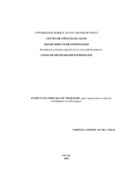Use este identificador para citar ou linkar para este item:
https://repositorio.ufrn.br/handle/123456789/14799| Título: | Aumento da jornada de trabalho :qual a repercussão na vida dos trabalhadores da enfermagem? |
| Autor(es): | Veras, Verônica Simone Dutra |
| Orientador: | Medeiros, Soraya Maria de |
| Palavras-chave: | Trabalho;Jornada de trabalho, Cotidianidade;Work;Workday;Daily living |
| Data do documento: | 15-Dez-2003 |
| Editor: | Universidade Federal do Rio Grande do Norte |
| Referência: | VERAS, Verônica Simone Dutra. Aumento da jornada de trabalho :qual a repercussão na vida dos trabalhadores da enfermagem?. 2003. 121 f. Dissertação (Mestrado em Assistência à Saúde) - Universidade Federal do Rio Grande do Norte, Natal, 2003. |
| Resumo: | O trabalhador do serviço público vem perdendo seu poder aquisitivo mediante às políticas de ajuste fiscal. As saídas encontradas no setor da saúde, sobretudo na enfermagem, vêm sendo o ingresso em outros empregos. O multiemprego e a adesão à escala-extra de plantão, fomentada pelo Estado, têm se materializado como um aumento na jornada de trabalho. Este trabalho tem por objetivo identificar as possíveis repercussões do aumento da jornada de trabalho no cotidiano dos trabalhadores da enfermagem do serviço público. A metodologia empregada foi a pesquisa qualitativa do tipo exploratória. As informações foram coletadas através de entrevista com perguntas abertas semi-estruturadas. A análise foi realizada através das categorias gerais, trabalho e cotidiano. Na análise, constatou-se que predominou entre os entrevistados a utilização de aumento de jornada de trabalho entre 80 a 120 horas mensais na forma de multiemprego; escala-extra de plantão; multiemprego e escala-extra simultaneamente e substituição em escalas de terceiros, denominada de sublocação. O cansaço e o estresse são fatores de redução do ritmo de trabalho. A redução do tempo livre produz nos trabalhadores angústia devido à diminuição da convivência familiar assim como de tempo para dedicação ao aperfeiçoamento técnico-científico e para o cultivo de outros aspectos da subjetividade, tais como lazer, auto-cuidado e cultura. Outro aspecto constatado foi a retirada de direitos, tais como férias e licença médica para os trabalhadores que atuam em escala-extra. Os baixos salários e o não reajuste são as causas apontadas para adoção por parte dos trabalhadores pelo aumento da jornada de trabalho, tendo sido o governo responsabilizado por esta situação. Concluiu-se que o aumento da jornada de trabalho tem fortes repercussões no cotidiano profissional e pessoal dos trabalhadores pesquisados |
| Abstract: | The worker of the public service is loosing your acquisitive power by means of the politics of fiscal settlement. The ways out that were found in the health sector, especially in nursing, is being the increasing workday for beyond 40 or 20 hours established in the link of the work with the state. This survey has the object to identify the possible repercussion of the increasing workday in daily life workers from nursing in the public service of Rio Grande do Norte. The theory reference used was the work of Marx (1982) and Antunes (2000,2001) and the daily living in Heller (1991,1992). The methodology used was a qualitative survey in the exploration kind. The informations were gathered through interviews with open questions almost structured with workers of nursing, managers and representatives of entity. The analysis of informations were made through general categories, work, and daily life, using elements from dialetics-hermeneutics according to Minayo (1992,2002). In the analysis, it was identified that the ways that were found for the overcoming of the loss of acquisitive power were the many-employment; the extra scale of shift; the subletting of work posts and the substitution of friends in scales of work, and all of them being changed in increase. Other aspect realized was the move of rights, like vacation and medical license for the workers that act in extra scale. The tiredness, stress, and bad humor are influents factors in the development of work.. The reduction of free time makes in the workers ahguish because of the familiarity decreasement just as time to dedicate themselves to the technical-scientific improvement and for the cultivation of other aspects of subjectivity, as leisure, care and culture. The low salary and the non reajustment are the reasons for the adoption of part workers for the increasing workday, and government has been responsible for this situation. The conclusion was that the increasing workday has strong repercussions in the professional and personal daily life workers that made part of the survey |
| URI: | https://repositorio.ufrn.br/jspui/handle/123456789/14799 |
| Aparece nas coleções: | PPGE - Mestrado em Enfermagem |
Arquivos associados a este item:
| Arquivo | Descrição | Tamanho | Formato | |
|---|---|---|---|---|
| VeronicaS.pdf | 298,31 kB | Adobe PDF |  Visualizar/Abrir |
Os itens no repositório estão protegidos por copyright, com todos os direitos reservados, salvo quando é indicado o contrário.

